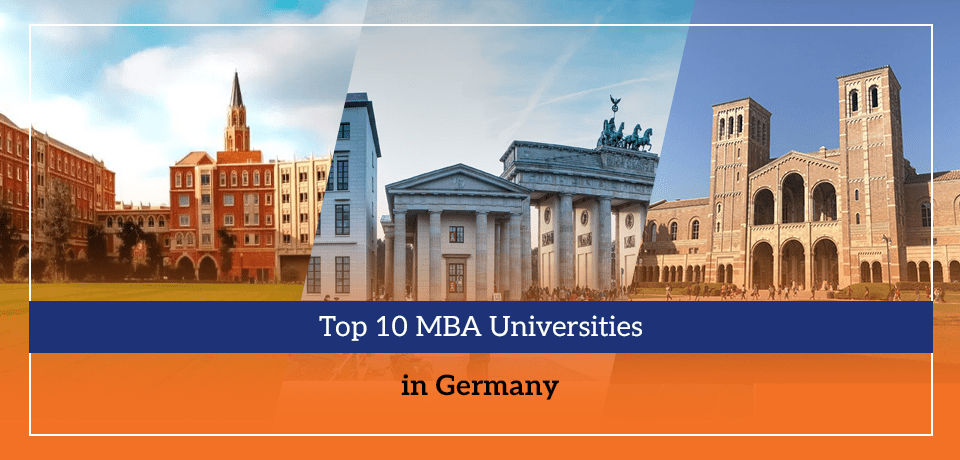Looking for a smart MBA choice? Germany might surprise you in the best way. The country is now one of the top MBA hubs in Europe. Every year, thousands of international students choose Germany for their business degrees.
You get high-quality education at a much lower cost than in other countries. German universities charge very little or no tuition. Business schools here offer global exposure, innovative learning, and strong job links.
This article is about the best universities in Germany for MBA. We’ll cover everything you need to know. Let’s begin!
Why Pursue an MBA in Germany?
One of the biggest reasons is cost. An MBA in the United States or the United Kingdom can be quite expensive. However, in Germany, even top-ranked MBA programs are significantly less expensive. Some public universities charge as little as €300 per semester. That’s less than many textbooks abroad! Private schools are more costly. But even then, they’re cheaper than many US programs.
Some of Germany’s top public universities offer MBA-related programs with tuition fees of zero or very low cost. Here are a few examples:
- University of Cologne (Cologne Business School): Only around €300 per semester
- Technical University of Munich (TUM): Offers top-ranked business programs at public rates
- University of Mannheim: Public school with world-class MBA at a mid-range fee
You only need to cover your living costs, books, and a few other things. So, if budget is a concern, Germany offers great value.
Another fact is that their ROI statistics are highly positive. Many German MBA graduates earn between €75,000 and € 100,000 per year after completing their degree. That’s a great return, especially when your tuition fees are low.

Top 10 MBA Universities in Germany for 2026
Germany has many business schools with top MBA programs. Some are private. Some are public. When listing the top-ranked German business schools, we’ve followed several criteria.
For example, we checked the QS Global MBA Rankings 2025. Then, we looked at employability. Diversity also matters. A good MBA class should comprise students from diverse countries and backgrounds. Additionally, we examined their global reputation. Many of these schools are top business schools in Europe.
Here is our list of the top 10 MBA universities in Germany:
- Frankfurt School of Finance and Management
- Mannheim Business School (University of Mannheim)
- WHU - Otto Beisheim School of Management
- HHL Leipzig Graduate School of Management
- EU Business School
- ESMT, Berlin
- TUM School of Management
- Cologne Business School (University of Cologne)
- Munich Business School
- Berlin School of Business and Innovation
Now, let’s look at them in detail.
1. Frankfurt School of Finance and Management
This school is one of the top business schools in Europe. It’s in Frankfurt, a city renowned for its finance sector. The campus is modern and located in the heart of the city. The school is private but highly respected.
Its Full-Time MBA lasts 12 months. The program is ranked #55 in the world (QS Global MBA Rankings 2025). There are students from more than 20 countries. You also get company visits, career coaching, and networking events. Many students find jobs quickly after graduation.
Tuition Fee: Around €41,900
2. Mannheim Business School (University of Mannheim)
The University of Mannheim is one of the top public universities in Germany for MBA. Mannheim Business School is part of it and operates privately. It’s located in Mannheim, in southwest Germany. The school is inside a beautiful baroque palace, but is very modern inside.
The Mannheim Full-Time MBA lasts 12 months. It’s ranked #56 in the world (QS 2025). It’s also among the top-ranked German business schools. The program includes workshops, projects, and international study options.
Tuition Fee: About €42,400.
3. WHU – Otto Beisheim School of Management
WHU is another big name in Germany. It has two campuses, Vallendar and Düsseldorf. The school is private but highly sought after by international MBA students. It ranks #67 globally for MBA (QS 2025).
The Full-Time MBA here takes 12 months. You can also extend it to 18 months if you want. The program includes leadership training, startup events, and global learning. Many students also take part in exchange programs abroad. WHU has close ties with prominent companies such as Bain, McKinsey, and Amazon.
Tuition Fee: Around €47,400.
4. HHL Leipzig Graduate School of Management
HHL is another top business school and one of Germany’s oldest. It’s located in Leipzig, a lively student city. This school is small but very focused on leadership and entrepreneurship. It’s known for building future business leaders.
Their Full-Time MBA takes 18 months. You can finish it in 12 months if you want. In the QS Global MBA Rankings 2025, HHL is listed among the top business schools in Europe. Many graduates get jobs in Germany or nearby countries right after graduation.
Tuition Fee: About €39,400.
5. EU Business School (Germany Campus)
The EU Business School is an international institution with campuses located in various countries. Its German campus is in Munich. The school focuses on innovation, international business, and leadership. The campus is in the heart of the city.
The MBA program allows you to specialise in areas such as marketing, HR, finance, or digital business. You can complete the MBA in one year (full-time) or over a longer period (part-time). Though not ranked globally like others, it is known for its flexibility and global connections. It is a good choice if you’re looking for an MBA in Germany with low tuition fees.
Tuition Fee: Around €21,000.
6. ESMT Berlin
If you’re aiming for top business schools in Europe, this one should be on your list. ESMT Berlin is one of the most elite business schools in Germany. It’s located in the centre of Berlin. The school is private, but major global companies, including Siemens and SAP founded it.
Its Full-Time MBA is highly respected worldwide. It’s ranked #43 globally in the QS MBA rankings 2025. The program lasts 15 months. Students come from over 30 countries. The school also offers strong career support and internship help.
Tuition Fee: €50,000.
7. TUM School of Management (Technical University of Munich)
TUM is one of the best public universities in Germany. It’s known for tech, business, and research. The TUM School of Management is in Munich, a top city for students and startups.
Its Executive MBA and MBA in Innovation & Business Creation are highly respected. TUM is part of the TU9 alliance, Germany’s top technical universities. In the QS MBA Germany rankings 2025, TUM is among the top-ranked German business schools. Most MBA programs are part-time or executive.
Tuition Fee: €28,000–€32,000.
8. Cologne Business School (University of Cologne)
This one is a mix of public and private. The University of Cologne is a public institution, while CBS is a private business school located nearby. Cologne is a large student city with a rich cultural heritage and a thriving business scene.
CBS offers an MBA in International Management. It is a full-time program with strong career support. The University of Cologne itself offers management-related master’s degrees without any tuition fees.
Tuition Fee: Around €300 per semester (at CBS).
9. Munich Business School
Another top private university for MBA in Germany is Munich Business School. It places a strong emphasis on business and leadership. It’s also based in Munich. It offers a Full-Time MBA in International Management program. The program lasts 15 months.
While not high in global MBA rankings, it’s a solid choice for career switchers or entrepreneurs. It has close links with global companies.
Tuition Fee: €24,900-€25,740.
10. Berlin School of Business and Innovation (BSBI)
BSBI is a growing private school in Berlin. It offers affordable business programs for international students. Its Global MBA is offered in partnership with UK universities. The University for the Creative Arts (UK) awards the degree.
It’s flexible, taught in English, and has multiple start dates. BSBI is budget-friendly and a great choice if you want to study in Berlin. The school also helps with internships and job applications.
Tuition Fee: €12,900–€18,900.
Top 10 MBA Universities in Germany at a Glance
|
University / Business School (Location)
|
Popular MBA Programs
|
Duration
|
Tuition Fee (€)
|
|
Frankfurt School of Finance and Management (Frankfurt)
|
Full-Time MBA
|
12 months
|
€41,900
|
|
Mannheim Business School (Mannheim)
|
Mannheim Full-Time MBA
|
12 months
|
€42,400
|
|
WHU – Otto Beisheim School of Management (Vallendar)
|
Full-Time MBA
|
12–18 months
|
€47,400
|
|
HHL Leipzig Graduate School of Management (Leipzig)
|
Full-Time MBA
|
12–18 months
|
€39,400
|
|
EU Business School (Munich)
|
MBA with Specialisations
|
12 months
|
€21,000
|
|
ESMT Berlin (Berlin)
|
Full-Time MBA
|
15 months
|
€50,000
|
|
TUM School of Management, TU Munich (Munich)
|
MBA / Exec. MBA / Innovation MBA
|
18–24 months
|
€28,000–€32,000
|
|
Cologne Business School / Univ. of Cologne (Cologne)
|
MBA Int’l Management / MSc Mgmt
|
18 months
|
~€300/semester
|
|
Munich Business School (Munich)
|
MBA International Management
|
15 months
|
€24,900–€25,740
|
|
Berlin School of Business and Innovation (Berlin)
|
Global MBA (UCA UK Degree)
|
18 months
|
€12,900–€18,900
|

Emerging Trends: MBA Specialisations Shaping 2026
The MBA world is changing fast. MBA programs are no longer what they were 10 years ago. Now, business schools in Germany are offering fresh, future-ready specialisations. These areas align with the actual needs of the job market.
Students want more than basic business knowledge. They want skills that open global doors. And German MBA programs are listening.
Let’s look at some hot MBA specialisations in 2026:
Digital Business and Innovation
Technology is transforming the way the world conducts business. So, more students now choose an MBA in Digital Business or Innovation Management.
Where can I study this in Germany?
- ESMT Berlin
- TUM School of Management
- HHL Leipzig
Data Analytics and Business Intelligence
Data is everywhere. But companies need smart people who can make sense of it. So, MBAs with a focus on Analytics and Data Science are rising fast.
Where to study this in Germany?
- Frankfurt School of Finance & Management
- WHU – Otto Beisheim School of Management
- Munich Business School
Sustainability and Green Business
More companies are now concerned about climate change and sustainability. They want leaders who understand green business, circular economy, and social impact. Germany, being a leader in clean energy, is an ideal location for this.
Where to study this in Germany?
- ESMT Berlin
- Mannheim Business School
- Cologne Business School
International Business and Global Management
Germany is a global business hub in Europe. That’s why many MBAs here offer International Business as a core subject.
Where to study this in Germany?
- EU Business School (Munich)
- Berlin School of Business and Innovation
- University of Mannheim

Admission Requirements: A Step-by-Step Guide
Applying for an MBA in Germany is a structured process. Here’s a simple guide to help you navigate it.
Academic Background
You’ll need a Bachelor’s Degree. Most German MBA programs require a completed undergraduate degree.
Standardised Test Scores
Many MBA programs in Germany require GMAT or GRE scores.
Language Proficiency
- English Proficiency: You must demonstrate English language proficiency through tests such as the TOEFL or IELTS.
- German Language Proficiency: Some programs, particularly those taught in German, may require proof of German language proficiency.
Work Experience
A minimum of two to three years of relevant professional experience is often required. Especially, full-time MBA programs require work experience as a must.
Application Documents
Prepare the following documents:
- Completed Application Form
- Bachelor’s Degree Certificate
- Transcripts
- Resume/Curriculum Vitae (CV)
- Recommendation Letters
- Statement of Purpose
Scholarships and Financial Aid for International Students
Germany offers many scholarships and financial aid options for international MBA students. Let’s look at a few scholarship options available to MBA students in Germany.
DAAD Scholarships (German Academic Exchange Service)
The DAAD provides scholarships for international students, including those pursuing an MBA. These scholarships are designed for students who demonstrate exceptional academic merit and wish to pursue their studies in Germany.
Konrad Adenauer Stiftung (KAS) Scholarship
The Konrad-Adenauer-Stiftung (KAS) offers scholarships for highly qualified international students pursuing their MBA in Germany.
Heinrich Böll Foundation Scholarships
The Heinrich Böll Foundation offers scholarships for international students, especially those pursuing degrees in sustainability, social entrepreneurship, and business.
University-Specific Scholarships
Many German MBA universities offer their own scholarships for international students. These are typically merit-based or need-based awards designed to reduce tuition costs. A few of them are:
- ESMT MBA Scholarships
- Frankfurt School Scholarships
- Mannheim Merit-based MBA Scholarships for international students.

Post-MBA Careers: Top Industries and Recruiters
Germany has one of the strongest job markets in Europe. MBA graduates here do well. Many students secure good jobs in consulting, finance, technology, and the automotive industry. These sectors offer well-paying jobs and provide opportunities for long-term growth.
Top Hiring Sectors for MBA Graduates
Consulting
Big companies like McKinsey, BCG, and Bain hire many MBA graduates. They offer roles like Business Consultant or Strategy Advisor.
Average salary: €85,000 to €120,000 per year.
Finance and Banking
Germany is a financial hub. Banks like Deutsche Bank and Goldman Sachs hire MBAs. Jobs include Financial Analyst or Investment Associate.
Average salary: €70,000 annually
Tech and IT
Tech jobs are growing fast in Germany. Companies like SAP, Bosch, and Siemens hire MBAs. You can work as a Product Manager or IT Consultant.
Average salary: €70,000+ annually
Automotive Industry
This is a strong sector in Germany. Think BMW, Volkswagen, and Mercedes-Benz. Job roles include Project Manager or Operations Manager.
Average salary: €70,000-€90,000
Marketing and Sales
Big brands like P&G, Unilever, and Adidas offer marketing roles. You could become a Brand Manager or Sales Strategist.
Average salary: €55,000, which increases with experience.
International Business
If you love global roles, this one’s for you. Companies like Amazon, Google, and Microsoft hire for international business roles.
Average salary: €65,000-€110,000.
Top Companies That Hire MBA Graduates
Here’s a short list of companies that hire from top MBA schools in Germany:
- McKinsey & Company
- Siemens
- BMW
- Bayer
- Deutsche Bank
- SAP
- Volkswagen
- Amazon
- Bosch
- Porsche
Public vs. Private Universities: Which is Better?
Germany has both public and private universities for MBA programs. Now, which one is better? Let’s compare both.
Public universities in Germany are renowned for offering low-cost or even free education. Some charge only semester fees (around €300–€600 per semester). If you're looking for a budget-friendly option, consider public universities.
However, you may not find many full-time MBAs at public universities. Instead, they often offer Master’s in Management (MiM) or Executive MBAs. Additionally, many public schools require proficiency in the German language. Some also offer programs in English.
Private business schools are more flexible and career-focused. If you’re seeking international exposure and career support, consider attending a private business school. They have strong ties with industries, offer English programs, and focus on global skills.
However, tuition is higher. Fees range between €25,000 and €50,000. However, many students argue that the ROI is worthwhile due to the benefits of improved networking and job support.
Navigating the German Student Visa Process
Now, let’s discuss how to obtain a student visa for Germany. This section is particularly important if you’re an international student planning to pursue an MBA.
Germany now allows online visa applications. You can now apply using the official site. Here’s what you usually need:
- A valid passport
- Admission letter from a German university
- Proof of financial support (blocked account or sponsor letter)
- Health insurance
- Visa application form
- Proof of accommodation
- Language certificate (if required)
- Passport photos
Financial Requirement: You must show at least €11,208 in a blocked account. The amount should cover at least one year of living costs in Germany.
When Should You Apply for a Student Visa?
Apply at least 3 months before your MBA course starts. Appointments at embassies or visa centres can take time, so don’t delay.

Frequently Asked Questions
Can I study MBA in Germany without GMAT?
Yes, many German MBA programs don’t ask for a GMAT score. Schools like ESMT Berlin or WHU often place a greater emphasis on work experience. But top-ranked MBAs may still prefer it. Always check the university’s website first.
What is the cost of living for MBA students in Germany?
Most students spend around €900 to €1,200 per month. This covers rent, food, transport, and insurance. Cities like Berlin or Munich may be more expensive. Public universities are generally more affordable, but living costs remain the same.
Are German language skills mandatory?
No, most MBA programs in Germany are in English. However, learning basic German is a significant advantage in daily life and the workplace. Some public universities may ask for German.
How to get a job after an MBA in Germany?
After your MBA, you get 18 months to find a job. Use your school’s career service, attend job fairs, and learn some German. Top schools have strong networks with global companies. Many students find jobs in consulting, tech, or finance.
Which MBA has the highest salary in Germany?
Graduates of the Frankfurt School and ESMT Berlin report the highest average salaries. According to QS 2024, their MBAs can earn over €90,000 per year. Industry, experience, and job type also affect salaries.
Is work experience required for German MBAs?
Yes, most German MBAs need at least 2–3 years of work experience. Executive MBAs may ask for even more. Some universities may have waivers for this. But always check the exact requirements for your chosen program.
Public vs. private MBA colleges: Which is better?
Public universities are generally more affordable but offer fewer MBA programs. They focus more on theory and research. Private schools offer better job support and global connections. They’re great if you’re looking for international exposure and networking.
What are the top MBA scholarships for international students?
Popular options include DAAD scholarships, ESMT scholarships, and Mannheim MBA Awards. DAAD offers full or partial funding. Many private schools also give merit-based aid.
Can I stay in Germany after my MBA?
Yes, international graduates can stay in the country for up to 18 months after completing their studies. This time is for finding a job in your field. Once you get a full-time role, you can apply for a work visa. Later, you can even apply for a pathway to permanent residency.
What are the best MBA specialisations for 2026?
Some of the top trending MBA fields include AI and Data, Sustainability, and Digital Business. Schools like WHU, ESMT, and TUM offer these. Finance and Consulting remain popular choices as well.
Conclusion
Germany is now one of the top destinations in Europe for pursuing an MBA. It offers world-class education, low tuition, and strong job options after graduation. You’ll find many programs with global rankings. From business hubs like Frankfurt to student cities like Munich, there are many choices.
We hope this guide about the best universities in Germany for MBA in 2026 will help you out. If you're exploring alternative STEM-focused paths, Germany also offers excellent programs in applied science. Select the right school, apply strategically, and plan for a successful future in Germany. If you want help with applications or scholarships, we’re always here to guide you!